There are many lessons to pick up from current events.When I was growing up, my parent’s generation believed that anything said on the BBC news was the truth. Questioning or contradicting the BBNC was like questioning the word of God and frowned upon.Needless to say… I was often sent to my bedroom. 🙂 Later, when I moved to America, I met people who felt the same way about CNN. (And similarly, when I questioned this, I was immediately ostracized.)I meet people today who believe the U.S. and U.K. are bastions of press freedom. Both countries exalt the virtue of free speech and how they’re better than most. It’s interesting, however, to note that the U.K. ranks in the Reporters Without Borders Freedom of Press index (https://rsf.org/en/ranking) at position #33 and the U.S. is down at #48, its lowest ranking since 2015. And the way the ‘news’ has been dosed out since this virus took center stage clearly shows why. If the only source of information was that given by the networks and our governments… we’d be more confused than Homer Simpson.The rank of press freedom goes from #1 (Norway) to # 180 (Turkmenistan). North Korea is unsurprisingly #179 and China #177. Scandinavia appears to be ‘the place to be’ to get independent news with Norway, Finland, and Sweden in the top three spots consistently for two decades. Not by chance, I follow several independent journalists who are based in Sweden. They’re not all Swedish, but they feel protected there. They provide me with fresh eyes on global events. I’m not saying I believe everything they write, but it helps me double-check what I’ve seen and heard elsewhere.I’m always leery when a major global crisis comes about, because those countries that suppress freedom of information will use the situation to tighten their grip.For example…Recently, the Hungarian government demanded an indefinite extension of the state of emergency. The bill gives prime minister Viktor Orbán sweeping powers to rule by decree, and the power to impose prison sentences of up to five years for promoting false information… That is, ‘false’ in his government’s eyes.On March 27th, at least 13 U.S foreign correspondents were forced to leave China — precisely at the moment when Beijing claims it has reined in the covid-19 epidemic within its borders. American journalists working in China for The New York Times, The Washington Post and The Wall Street Journal were supposedly being expelled in a measure meant as a “reprisal” against Washington’s moves to limit the influence of China’s propaganda media in the United States.The timing, however, is hardly coincidental.
The Indian government has cut (4G) Internet in the Kashmir Valley where the Covid-19 pandemic is a hotspot. Mobile phone Internet continues to be limited to 2nd generation (2G) and the prepaid connections normally used by 3/4 of the public are still banned.The Russian government has also stepped up control of domestic reporting in connection with the coronavirus epidemic while, according to the European Union, conducting a disinformation campaign about it internationally. Russian journalists covering the coronavirus are being targeted by Roskomnadzor, the media control agency. Radio Echo Moskvy, Facebook, and the Russian social network VKontakte were also forced to delete posts at the start of the week under the law of disinformation that took effect in March 2019.Two foreign reporters, Guardian correspondent Ruth Michaelson and New York Times Cairo bureau chief Declan Walsh, were called in for questioning by the Egypt State Information Service. Michaelson was expelled on March 20th, three days after her accreditation was withdrawn over an article questioning Egypt’s then official figure of around 100 coronavirus cases — citing Canadian medical researchers who estimated that Egypt must already have more than 19,000 cases.The funny thing is…In the West, we’re used to these stories, maybe even expect them, and we associate them with foreign regimes. Unfortunately, we don’t look inwards very often and question our own sources of information.For instance, in America journalists are officially prohibited from communicating with anyone in the CDC and other federal agencies without the oversight of censors with the official title of ‘public information officer’ or PIO. Reporters also can’t just walk into their buildings, and there are often no systems for obtaining any sort of press credential. Usually, prohibitions are followed: agency staff people don’t talk without the censors because they’re under harsh prohibitions not to do so. Beyond that, often reporters are not allowed to communicate with the person they request (or to anyone at all) in the Department of Health and Human Services (HHS) and other federal agencies, even after they go through all the permission-seeking. If any contact is allowed, the PIO may listen in to the conversation and may direct what can be discussed. These restrictions have surged in the U.S. over the last 25-30 years to the point that they’re a cultural norm. Surveys by the Society of Professional Journalists show they’re pervasive in federal, state, and local governments, scientific organizations, educational institutions, and police departments.Business and other private organizations are often just as restrictive.You might also be surprised to read that, since the mid-2000s, there’s been a gradual shift toward increased surveillance and police measures in the U.K. National security concerns, terrorism and crime, and issues regarding child protection have resulted in the state introducing extensive surveillance measures over online communications, as well as filtering and tracking practices. In some cases, these are encouraged or required by the state and used by state agencies. The U.K. was listed among the ‘Enemies of the Internet’ in 2014 by Reporters without Borders as a category of countries with the highest level of internet censorship and surveillance who ‘mark themselves out not just for their capacity to censor news and information online, but also for their almost systematic repression of Internet users’.Other major economies listed in this category include China, Iran, Pakistan, Russia and Saudi Arabia.So, in short…As my father used to tell me, ‘Take nothing at face value. Go find the truth yourself.’ To get to the truth, don’t believe everything you see on BBC or CNN. Seek out independent sources.Okay, now I’ll voluntarily go to my bedroom.CheersTrev




